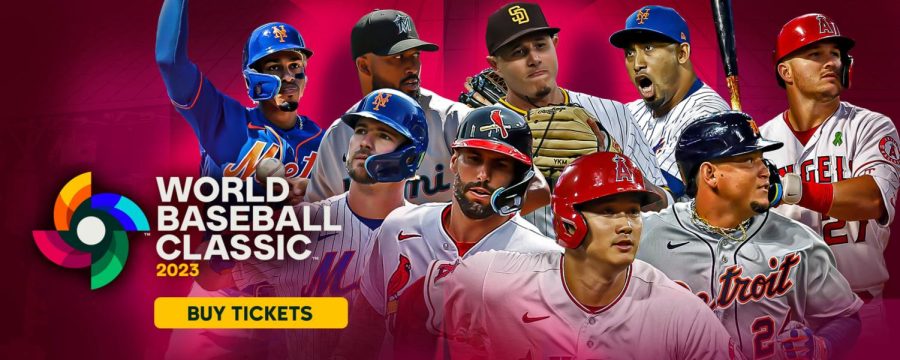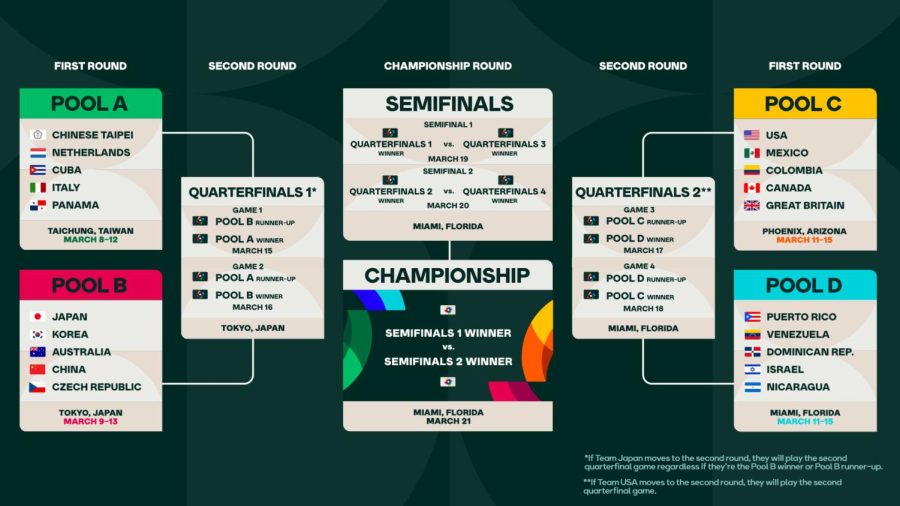WBC 2023: Primer
If you’ve ever heard someone joke “why’s it called the World Series if only Americans and Canadians get to play,” well, your answer should be the World Baseball Classic—or it would be, if anyone had ever heard of it before this year.
On paper, it’s the greatest thing ever: a bunch of countries put together baseball rosters and fight it out in a global tournament to determine who gets to be the international king of the baseball hill (mound?) for the next four-year period. This occurs, by the way, on a totally different schedule from Olympic baseball, which 1) isn’t always on the schedule for the Games and 2) doesn’t operate by quite the same rules, although both are ultimately governed by the World Softball Baseball Confederation.
There have been four prior iterations of the Classic (WBC, from here on out), and a quick look at each year’s top four teams features exactly the countries you’d expect.
- 2006: Japan beat Cuba, with South Korea and the Dominican Republic finishing third and fourth. This particular WBC is near and dear to Mr. Morales-Bermúdez’s heart, both because he managed to catch a game in Puerto Rico with his cousins, and also because he remembers reading a lot of sportswriters who clearly didn’t watch a second of the entire tournament stereotyping each national team. 16 countries competed.
- 2009: Japan beat South Korea, with Venezuela at third and the U.S. at fourth. The same 16 countries competed.
- 2013: The DR shut out Puerto Rico, with Japan and the Netherlands bringing up the rest of the top field. 2009’s top twelve teams made the field, with Spain and Brazil showing up for their first appearances. Both lost all three pool games.
- 2017: The United States also shut out Puerto Rico, which this time had gone undefeated until the final series. (I don’t want to talk about it. Rigged.) Japan and the Netherlands, once again, filled out the top field. Colombia and Israel came in for their first turn at the WBC. Both finished 1-2 in the pool.
The hypernumerate among you will likely have noticed that the next iteration, going by the four-year cycle established in 2009, would’ve been in 2021, but while COVID didn’t stop Major League Baseball from slapping together a shortened season full of weird games and Tommies John, no one was going to try and organize a proper international competition that required multiple appearances in various countries. Between the pandemic and MLB’s efforts to secure a field of 28 teams willing and able to try qualifying for the WBC, the fifth tourney would end up being pushed to, well, this year.
Qualifiers featured some real shockers, as you might expect when you nearly double the number of available competitors. Argentina, Nicaragua (where Roberto Clemente’s #21 is retired leaguewide, like it would be if Rob Manfred weren’t a coward—more on that later), Great Britain, France, Germany, New Zealand, the Czech Republic (no, seriously) and Pakistan (no, seriously) all joined the field. Great Britain made it; so did Nicaragua; so did, unbelievably, the Czech team, which features one guy who’s played extensive pro ball and which survived a 21-7 pasting from the Spaniards to beat them, 3-1. There’s apparently a documentary about them.
Now that the qualifiers are past, here’s the pool setup. Each team plays every other team in their pool once (a round-robin stage, if you’re familiar with the term), after which the winner and runner-up of each pool advance to the knockout stage, at which point I assume the umpires receive the second half of their bribes to make sure whatever geopolitical outcome you disfavor will come to pass.
Here’s what that looks like.
I already have problems with this. Some of you may not realize why, so let me quickly count up for you which teams in each of these pools have a realistic chance at winning the whole thing.
- Pool A: Cuba. That’s it. Okay, I’m being a little dismissive. The Netherlands (#7) have an outside shot if they’re allowed to load up the roster, and Chinese Taipei is currently #2, plus both countries have homegrown leagues, so that has to count for something—but even though the Cubans are officially #8, and even though a lot of MLB teams are trying to make it impossible for their Cuban players to join up for the Classic, I suspect they aren’t going to go quietly.
- Pool B: Japan, (South) Korea. (Don’t think I didn’t notice that subtle omission.) These two are currently ranked #1 and #4 in the world, respectively, and both have active professional leagues. I’d expect both of them to make it out of pool play and make things interesting for whoever the Pool A winner is.
- Pool C: The US (#3 globally) and Mexico (#5). Mexican baseball is way, way more alive than anyone north of the border gives it credit for, unless one of their favorite . . . or least favorite . . . players ends up there. They’re the team I hope makes a deep run this year, largely because it would likely require them winning the pool over the US, which has to be going into every WBC as the favorite considering that it’s the country with the largest amount of pro ball players on its roster. (More on that later, again.)
- Pool D: Puerto Rico (#13), Venezuela (#6), and the Dominican Republic (#9) all have shots at this. Beyond my obvious national bias, the boricuas made the finals in 2013 and 2017 despite being ranked #12 in both of those years, but all three of these teams provide sizable percentages of players to MLB teams. In other words, it’s entirely possible—in fact, by the format of the tournament, it is required—that a baseball powerhouse go home after the first round. That “D” must stand for “death.”
As if that wasn’t bad enough, this is the first iteration of the WBC in six years, which means MLB teams have learned a lot about analytics, load management, and injury recovery since the last tournament, particularly when it comes to pitchers, whose arms can and often do make the difference between a playoff contender and a midsummer flameout. At its best, all of this new knowledge has helped keep great hurlers working for longer: Clayton Kershaw had to figure out how to throw with sides stiffening with age, Justin Verlander returned from Tommy John at age 39 to throw fastballs more up in the zone than he ever had, and Jacob deGrom . . . well . . . keep doing what you’re doing, Jake.
At its worst, you get the fact that very few marquee American pitchers are participating. Locking up position players were no trouble for Team USA, but as far as hurlers, well . . . there is a nonzero possibility that Houston closer Ryan Pressly starts a game for the first time in years, simply because there’s not that many guys left on the roster who have that kind of experience.
I’m being unfair again, because the fact is that very few marquee pitchers of any nationality are participating. The difference here is that American pitchers have, for the most part, been allowed to make up their own minds on the subject—but Dominican, Venezuelan, Cuban and Puerto Rican players, among others, have instead been subjected to this weird ritual where their MLB teams pretend that it was a “mutual” decision for, say, Luis Castillo or Yordan Álvarez to sit out a great chance to represent their home nation. If I were conspiratorially minded, I’d say the US so dislikes the possibility that it might lose at this WBC that it’s trying to make sure its rival powerhouses are brought as low as its own team—and I am conspiratorially minded, so I am saying that. Perhaps if some of the great US pitchers were willing to risk their arms in international play, their clubs wouldn’t feel the need to make sure all of the other big baseball countries were less stacked.
This is where I’d love to tell you more about the rosters for each team, but unfortunately, I’ll find that out the same day this article comes out, as the official reveal is on February 9th. Having said that, I’ve got a few picks already lined up.
- In Pool A, there was never any option but Cuba. If the Netherlands make it out, and I like their roster, maybe—maybe—I’ll cheer for them. But I’m more likely to hope whoever gets out of B wrecks them. Sorry, Italy.
- In Pool B, as sentimental as I want to be by picking the Czech Republic—and though I certainly hope they win some games—I’m too attached to Koo Dae-sung, noted man who pitched at 53 years old, not to cheer for Korea. Japan’s already gotten two titles.
- In Pool C, it’s Mexico all the way. For one, it’s really either Mexico or Colombia, but I know the latter’s chances against the US, Canada, and Great Britain, all of whom, frankly, play baseball wrong,* so we’re being realistic.
- If you even have to ask whom I’ve got in Pool D, you’ve never met me. It’s Puerto Rico all the way. Sorry, Nicaragua.
Whatever my problems with the WBC’s structure and player policies, I’m betting it’ll still be a lot of fun baseball to watch. Keep your eyes open—perhaps there’ll be updates as the tournament moves along.
* in English

